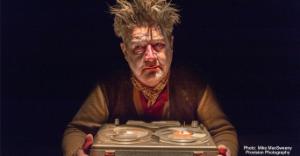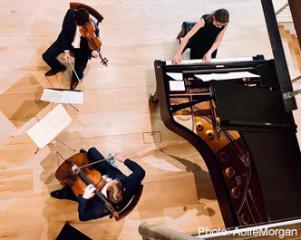Beckett Confined 6-8 May 2022
A weekend festival of the works of Samuel Beckett, exploring the politics of closed space as a reading of our times.
In 2022 The University of Liverpool’s Institute of Irish Studies and The Keough-Naughton Institute for Irish Studies at the University of Notre Dame's Keough School of Global Affairs, in association with Unreal Cities was pleased to present Beckett: Confined, a three-day festival of Samuel Beckett’s plays, associated musical performances and lectures.
Samuel Beckett (1906-1989) was one of the 20th century’s most celebrated playwrights and authors, winning the Nobel Prize for Literature in 1969. His works examine what it means to be human, in all its absurd, existentialist and sometimes bleak comedy.
The programme presented an exciting blend of Beckett’s work, including multiple performances of some of his most rarely performed plays – Ohio Impromptu, Catastrophe, and Krapp’s Last Tape, alongside a musical series featuring Words and Music, his radio play collaboration with Morton Feldman, and a Ghost Trio concert with Fidelio Trio performing Beethoven and Schubert, two of his favourite composers.
Central to the programme was a keynote by James Little introduced by Frank Shovlin, and a roundtable “Samuel Beckett’s Politics of Confinement” with William Davies, Emilie Morin and Hannah Simpson.
Beckett Confined presented his works in some of Liverpool’s most interesting and non-traditional performance spaces, bringing them alive in new and unconventional ways.
The plays
Catastrophe
Catastrophe is a short play by Samuel Beckett, written in French in 1982 at the invitation of A.I.D.A. (Association Internationale de Défense des Artistes) and first produced in the Avignon Festival (21 July 1982) … Beckett considered it ‘massacred. It is one of his few plays to deal with a political theme and, arguably, holds the title of Beckett's most optimistic work. It was dedicated to then imprisoned Czech reformer and playwright, Václav Havel. In the one act play Beckett uses the world of theatre and its hierarchies as a metaphor of power, of the violence of totalitarianism and of the fight against them.
 Krapp’s Last Tape
Krapp’s Last Tape
Krapp’s Last Tape is a one-act play, written in English in 1958, by Samuel Beckett. The play consists of a cast of one man and a tape recorder. The plot takes place on Krapp’s sixty-ninth birthday and, as has become his custom, he hauls out his old tape recorder to review one of the earlier years – in this case the recording he made when he was thirty-nine and makes a new recording commenting on the events of the previous twelve months. Through the recordings Krapp reviews his own past, and slowly the audience understands that he has nothing left but his past as his voice on tape.
Ohio Impromptu
Ohio Impromptu is a "playlet” by Samuel Beckett written in 1980, Beckett’s colleague, the scholar, S.E. Gontarski, requested that Beckett produce an intense piece to be performed at an academic symposium in Columbus, Ohio in honour of the playwrights seventy-fifth birthday. The play operates around a Doppelgänger seen as mirror images and is representative of Beckett’s ghost period, and the symbolism of apparitions that reverberate the haunting nature of memory and nostalgia.
Unreal Cities would like to acknowledge the Happy Days Enniskillen International Beckett Festival as the origin of the productions of Ohio Impromptu and Catastrophe
Words and Music
In 1961 Samuel Beckett wrote Words and Music for BBC radio, a play featuring the two characters “Words” and “Music” (also referred to as Joe and Bob). The work was withdrawn following the première due to Beckett’s dissatisfaction. 20 years later, Beckett suggested that Morton Feldman should compose the music, resulting in the first complete performance in 1987 (the year of Feldman’s death), produced for the American Beckett Festival of Radio Plays. In Feldman’s words: ‘It was a huge amount of fun to do something for Beckett, a sort of tribute to him, i.e. someone who has been part of my life since the ‘50’s … it was to some extent a labour of love, which I happily undertook.’
The Festival was funded by The Institute of Irish Studies, University of Liverpool, University of Notre Dame and Culture Ireland, and with thanks to University of Liverpool Alumni and Friends fund for their generous support of the Beckett Student Ambassador Scheme at the festival.

Beckett Confined Programme
 Friday - 6 May 2022
Friday - 6 May 2022
2pm Catastrophe – Toxteth Reservoir SOLD OUT
2.30pm Welcome address – Toxteth Reservoir
3.30pm Catastrophe – Toxteth Reservoir
4pm Krapp's Last Tape – The Black-E SOLD OUT
6pm Ohio Impromtu – Toxteth Reservoir SOLD OUT
8pm Ghost Trio (Schubert, Beethoven) – Tung Auditorium
Saturday - 7 May 2022
9am-10am Readings – Secret Locations (check back closer to the date for details)
11am Catastrophe – Toxteth Reservoir SOLD OUT
12pm Ohio Impromptu – Toxteth Reservoir SOLD OUT
12.30pm Ohio Impromptu – Toxteth Reservoir
1:30pm In Confinement: Keynote - Tung Auditorium
4pm Catastrophe – Toxteth Reservoir SOLD OUT
5:30pm Ohio Impromptu – Toxteth Reservoir SOLD OUT
7pm Words and Music – Tung Auditorium
8pm Krapp's Last Tape – The Black-E SOLD OUT
Student-led post-show discussion of Ohio Impromptu, Catastrophe, and Krapp’s Last Tape
Please join University of Notre Dame graduate students as they host public discussion groups intended to reflect and expand upon the performances at the Beckett in Confinement Festival.
These PhD students from the English department at Notre Dame have been engaged in a yearlong discussion group on Beckett's works and are happy to open this group up to any and all who might have an interest in Beckett's plays. Discussion will be informal but invigorating.